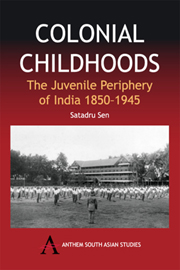Book contents
- Frontmatter
- Contents
- Dedication
- Acknowledgements
- Introduction
- 1 State of the Experiment: Experts, Parents and the Reformatory
- 2 The Nature of the Beast: The Content of Institutionalized Childhood
- 3 Experimental Childhoods: Pain and the Reformatory
- 4 Gendering the Reformatory
- 5 Masters and Servants: School, Home and Aristocratic Childhood
- 6 The Politics of Deracination
- Conclusion
- Notes
- Bibliography
- Index
- Frontmatter
- Contents
- Dedication
- Acknowledgements
- Introduction
- 1 State of the Experiment: Experts, Parents and the Reformatory
- 2 The Nature of the Beast: The Content of Institutionalized Childhood
- 3 Experimental Childhoods: Pain and the Reformatory
- 4 Gendering the Reformatory
- 5 Masters and Servants: School, Home and Aristocratic Childhood
- 6 The Politics of Deracination
- Conclusion
- Notes
- Bibliography
- Index
Summary
In India in 1876, the colonial government passed the Reformatory Schools Act, providing a common structure of guidelines and rules to a mechanism of juvenile delinquency that had been taking shape in the provinces since mid-century. In the same decade, British educators and administrators in the princely states established the institutions that became known as the Chiefs' Colleges. Linking these apparently disparate episodes is the child: the criminalized child from the margins of native society, the effete child of the decadent aristocracy, and always, in the shadows, the European child that might serve as model, measure and foil. These childhoods emerged at a particular moment in the encounter between a western-European metropole, its imperial agents and people who would be described by Kipling as ‘half devil and half child’. Reformatories and boarding schools enabled experiments with the relationship between the devil and the child, and raised questions about whether devilry and childhood could co-exist. From the outset, as such, colonial child-saving developed as an ‘investigative modality’.
In the mid-nineteenth century, the dominant metropolitan assumptions about childhood were its plasticity and its innocence. These assumptions were hardly uniform, being contingent upon the location of the child on the metropolitan map of class, gender, race and urban/rural geography. Some children — the poor, the delinquent, the Irish, the gypsy, the girl, the homosexual, the ‘precocious’, the adolescent — were either more plastic and innocent, or less so, than others; germs of instability were ingrained in the Victorian child.
- Type
- Chapter
- Information
- Colonial ChildhoodsThe Juvenile Periphery of India 1850–1945, pp. 1 - 8Publisher: Anthem PressPrint publication year: 2005



